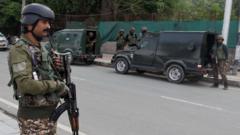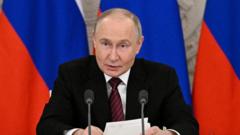Following a brief but intense military confrontation, India and Pakistan have declared a cease-fire mediated by the U.S. government. While both countries claim victory, underlying tensions exist, particularly around the U.S.'s perceived role, which has touched political sensitivities in India.
A Fragile Truce: India and Pakistan Both Declare Victory Post-Conflict

A Fragile Truce: India and Pakistan Both Declare Victory Post-Conflict
As a cease-fire takes hold, both nations assert their triumphs in the wake of U.S. mediation, revealing the complexities of diplomatic relations in the region.
The cease-fire between India and Pakistan has ushered in a fragile peace after a four-day conflict marked by the use of drones, missiles, and heavy artillery. This halt in hostilities comes after President Trump announced the agreement on Saturday, noting that U.S. mediation played a vital role in restoring calm. In a subsequent statement on Sunday, Trump commended both nations for recognizing the need to end escalating aggression that threatened widespread devastation.
In the wake of this conflict, both countries are making claims of a victorious outcome. Pakistan has openly lauded the United States for its mediating efforts. Conversely, in India, the description of U.S. involvement in the truce has struck a nerve politically. The Indian administration has long maintained that its relationship with Pakistan should be addressed bilaterally, and post-agreement, it emphasized that discussions leading to the cease-fire were directly between Indian and Pakistani officials.
The tense atmosphere surrounding the Kashmir region continues to cloud interactions, with Trump indicating a desire to strengthen trade relations with both nations while seeking a long-term resolution to the ongoing dispute. The contrasting narratives from India and Pakistan regarding territorial disagreements and military engagement suggest a continuing complexity in regional diplomacy. As the situation unfolds, the effectiveness of this cease-fire and the role of external mediators will be closely scrutinized.






















